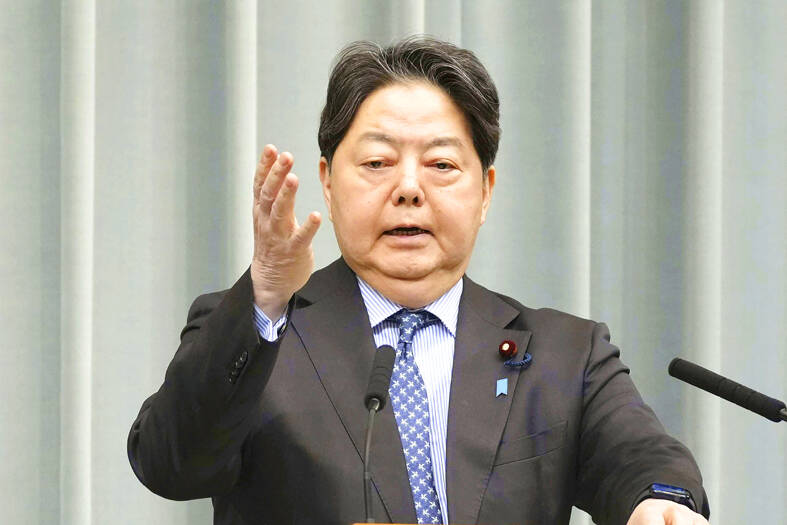The Japanese government yesterday said that it is committed to bolstering its military alliance with Washington, after reports said the Pentagon was considering scrapping a plan to expand US Forces Japan.
The US has about 54,000 military personnel in Japan who currently report back to Indo-Pacific Command in Hawaii, but the two nations are planning to upgrade this command structure with a new Japan-based headquarters under an agreement made last year between then-US president Joe Biden and then-Japanese prime minister Fumio Kishida.
The move is meant to make US and Japanese forces more nimble in response to threats such as a Chinese invasion of Taiwan.

Photo: Kyodo News via AP
US networks CNN and NBC News this week reported that US President Donald Trump’s administration could put the brakes on those plans as part of a sweeping government cost-cutting drive.
The reports, which have not been confirmed by Washington, cited a briefing document and a US defense official.
They said a move to halt a planned expansion of US Forces Japan would save about US$1.1 billion, but also warned it could create political risk for the US in Japan, while reducing the scope of US command and control in the Asia-Pacific region.
Japanese Chief Cabinet Secretary Yoshimasa Hayashi yesterday said that there is “no change” to the nations’ agreement to enhance their deterrence capabilities under the US-Japan alliance.
“We want to continue the close discussions between Japan and the United States ... to further strengthen the interoperability and responsiveness” of the two militaries, Hayashi told reporters.
He did not comment directly on whether the US had explained the reported plans to Japan.
Japan is in the process of increasing its defense spending to the NATO standard of about 2 percent of GDP.
Now the nation faces a delicate diplomatic dance as Trump presses its allies to take more responsibility, fiscally and otherwise, for their defense.
Japan relies on the US military to defend itself, but its presence is a delicate subject in the nation.
The Japanese public has voiced anger over crimes and accidents, particularly concerning sexual violence in Okinawa, where most of the US troops are based.

‘ABUSE OF POWER’: Lee Chun-yi allegedly used a Control Yuan vehicle to transport his dog to a pet grooming salon and take his wife to restaurants, media reports said Control Yuan Secretary-General Lee Chun-yi (李俊俋) resigned on Sunday night, admitting that he had misused a government vehicle, as reported by the media. Control Yuan Vice President Lee Hung-chun (李鴻鈞) yesterday apologized to the public over the issue. The watchdog body would follow up on similar accusations made by the Chinese Nationalist Party (KMT) and would investigate the alleged misuse of government vehicles by three other Control Yuan members: Su Li-chiung (蘇麗瓊), Lin Yu-jung (林郁容) and Wang Jung-chang (王榮璋), Lee Hung-chun said. Lee Chun-yi in a statement apologized for using a Control Yuan vehicle to transport his dog to a

Taiwan yesterday denied Chinese allegations that its military was behind a cyberattack on a technology company in Guangzhou, after city authorities issued warrants for 20 suspects. The Guangzhou Municipal Public Security Bureau earlier yesterday issued warrants for 20 people it identified as members of the Information, Communications and Electronic Force Command (ICEFCOM). The bureau alleged they were behind a May 20 cyberattack targeting the backend system of a self-service facility at the company. “ICEFCOM, under Taiwan’s ruling Democratic Progressive Party, directed the illegal attack,” the warrant says. The bureau placed a bounty of 10,000 yuan (US$1,392) on each of the 20 people named in

The High Court yesterday found a New Taipei City woman guilty of charges related to helping Beijing secure surrender agreements from military service members. Lee Huei-hsin (李慧馨) was sentenced to six years and eight months in prison for breaching the National Security Act (國家安全法), making illegal compacts with government employees and bribery, the court said. The verdict is final. Lee, the manager of a temple in the city’s Lujhou District (蘆洲), was accused of arranging for eight service members to make surrender pledges to the Chinese People’s Liberation Army in exchange for money, the court said. The pledges, which required them to provide identification

INDO-PACIFIC REGION: Royal Navy ships exercise the right of freedom of navigation, including in the Taiwan Strait and South China Sea, the UK’s Tony Radakin told a summit Freedom of navigation in the Indo-Pacific region is as important as it is in the English Channel, British Chief of the Defence Staff Admiral Tony Radakin said at a summit in Singapore on Saturday. The remark came as the British Royal Navy’s flagship aircraft carrier, the HMS Prince of Wales, is on an eight-month deployment to the Indo-Pacific region as head of an international carrier strike group. “Upholding the UN Convention on the Law of the Sea, and with it, the principles of the freedom of navigation, in this part of the world matters to us just as it matters in the